Families and Science: Can They Mix?

This is the first of a three part series about having a family during the time of your scientific training.
When is the right time to start a family?
This is really an impossible question, since there’s never a perfect time. The balancing act of work and family is a challenge even under the best circumstances.
We talked to NIH grad students, postdocs, and clinical fellows who decided to go for it during their time here. We compiled their lists of pros and cons, and sought their advice for students and fellows considering taking the plunge.
Question 1: Why was this a good time for you to start a family?
Their answers:
A flexible work schedule that allows wiggle room for sick days and day care emergencies.
Manageable workload compared to what they expect later in their careers. Though NIH students and fellows often work long hours, several shared their desire to get the baby years over with before their work lives get even busier, for instance as new faculty members running independent research labs. This was the case for Anna: “The reason my two kids are going to be so close together in age is that I wanted to have my second child also during my postdoc, rather than as a new faculty member.”
Maternity and paternity leave (for IRTA/CRTA fellows): 8 weeks of paid leave for the birth or adoption of child. Many fellows discuss their amount of leave with their principal investigator or supervisor. FTE fellows (such as research and clinincal fellows) first must use their annual leave, and then can take unpaid family leave or receive annual leave donations.
Health insurance for IRTA and CRTAs covers nearly the entire cost of the pregnancy and covers dependent children at no additional cost. FTE health insurance is a bit more complicated, but there are still very good options.
The NIH Nursing Mother’s Program. This was a life-saver for many of the new mothers we interviewed. The program features breastfeeding and return-to-work classes, phone support from lactation consultants during maternity leave, and lactation rooms available in multiple buildings on campus.
The ticking clock. Several trainees pointed out that their NIH years occupied a key place in their reproductive lives. They were willing to face any challenges rather than risk potential consequences of waiting.
The opportunity to adjust to parenthood before making long-term career choices. It’s hard to know in advance how having a baby will affect your career goals. Some fellows felt relieved to have been able to figure this out relatively early in their training. For Stephanie, “[having children during my postdoc] allowed me to look for a job with my own career priorities in place. I knew what I could handle, work-wise, while parenting two small children.”
Believe it or not, parenting can actually make you a better scientist. You wouldn’t necessarily predict this, but several trainees said that having children actually made them MORE productive at times, because they came to work each morning knowing that they had a limited number of hours to accomplish something that day. Natalie, a grad student in NIDDK, said ”One of the reasons I have been successful thus far in my career stems from my struggles as a parent. I have learned that being focused (a must for working parents) actually puts you one step ahead.”
Coming up in the next two posts: Challenges to having a family during training and words of wisdom. Check back soon!

